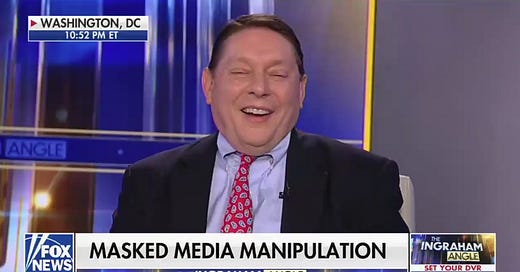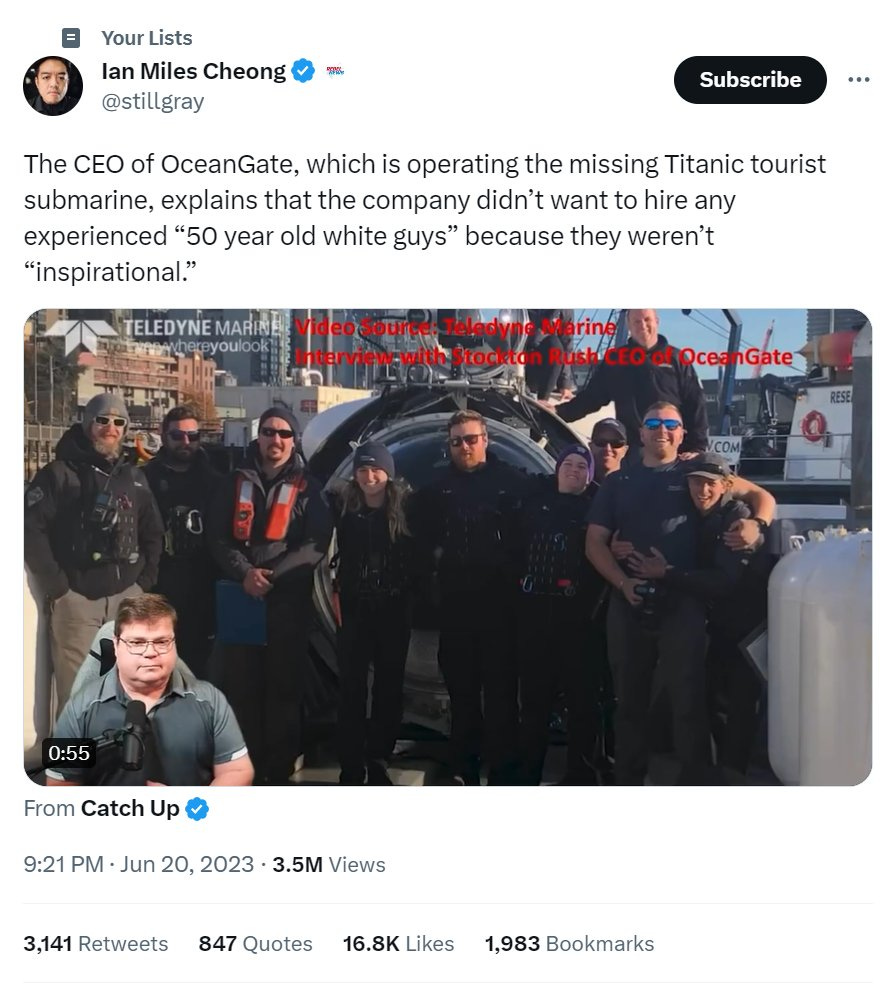The open argument must be fed: The peculiar case of Fox News and the pleasant smoke
Why Fox News can't tell you to put on a mask in a wildfire
In case you didn’t hear, smoke was bad in NYC a couple of weeks ago. A thick blanket of the stuff, the result of distant wildfires, cloaked the city. The AQI was over 400 in places, which to health departments is “please don’t go outside” weather, “wear a mask if you do” weather, “but really, for the love of god, stay inside” weather.
Into all of this came Fox News. In a viral clip, Fox commentator Steven Milloy assured the public there is no danger.
The claim — the smoke’s not bad for you. If smoke was bad for you then campfires would have killed us long ago. It’s just fine particulate matter, which is a class of semi-imaginary threats that was cooked up by the EPA in the 1990s. Wearing a mask is dumb and the panic is dumb.
Now I’ve been through a lot of wildfire smoke events. And let me tell you — a) they make it hard to breathe, especially if you’re asthmatic, but for anyone under exertion, b) some health effects of them are unknown, but a growing body of evidence points to pretty bad effects for people with underlying conditions, c) you don’t even need the science here because you can walk outside and see how crappy you feel, and d) I can’t stress this enough, but wearing a good N95 mask makes such a profound difference, and one that you immediately feel.
So much of this can be garnered by direct experience in this case but it’s worth noting that SIFT would help you here too. Investigating the source here gets you pretty important context:
Milloy, according to Wikipedia, has made a career of disputing a lot of real world harms. In SIFT we talk about what we want out of a source. We want someone who knows what they are talking about, and has strong incentives to “take care with the truth.” Milloy is not that person.
Reasonableness and argument: a brief review
From a pure SIFT perspective we could stop there. You checked the I, it’s clear that this is not where you want to get information from. But there’s a larger thing going on here that I think is worth pointing out to students. The “dangers of smoke” — something which should be pretty simple to talk about — was pulled into an ongoing argument. And that ends up producing some patterns that can be weird to the casual observer.
Humans are animals that make arguments. It’s pretty deep in our nature. As I’ve discussed in previous posts, people often think that arguments are about “proving” something is true but that isn’t quite right. The best way to think of an argument (and here I pull from my own mishmash of a number of modern philosophers) is that argument is an attempt by a speaker to enhance or undermine the reasonableness of a position (my notes attribute this use of “reasonableness” to McKeon in 2013, but it’s a bit of a scrawl, and I was reading a lot of Robert Pinto back then too).
What do we mean by that? And why are we making it so complex? Why not just say argument attempts to convince someone that something is true?
The reasonableness of a position: a review
This is a bit of a review of the first post in this series, but it will be quick. Say I am trying to convince you that a friend of yours that just asked you for a loan is not the most trustworthy person. I could just say that. And maybe I do, maybe I blurt that out. “Is Jake really the person you want to trust with ten grand?”
What have I done here? The first thing to realize is that I am reacting to what I believe is (or may be) a difference between your position and mine. From my perspective, your attitude to the proposition “Steve is a person one could trust with ten grand” is something like “probably”. And my opinion is not necessarily “no” but it tends towards “probably not”. The idea of argument, from my perspective, is to get you to see that my position on this question is reasonable. Depending on how intense I am about this question, I may also wish to show you that your position is unreasonable.
To enhance the perception of the reasonableness of my position (and perhaps the unreasonableness of yours) I offer evidence:
Steve had a bit of a gambling problem in the past
Steve’s job pays fairly little, it’s not clear how he would pay it back
Steve has a habit of not returning things
Steve once had a car repo’d
You then, in an effort to maintain the reasonableness of your position (that he probably can be trusted) do one of a number of things.
You can dispute the validity of the evidence. For instance, perhaps you reply that its actually a myth that his car got repo’d; this was a story that went around, but in reality his car was simply towed due to a parking issue.
You can dispute the relevance of the evidence. Perhaps you think that Steve not returning things isn’t really relevant — in what way does not returning a record predict not returning thousands of dollars? The evidence is irrelevant to your point.
You could introduce new evidence that undermines the relevance of the evidence. For instance, Steve might have a small salary, but in fact has paid off his house, and could access a large sum of money at any point.
You could accept everything, but argue that even with all these things on the table “probably not” is still too harsh.
You could make an argument that some of these things were true, but there was substantial counter-evidence that rendered this evidence of lesser significance. For instance, perhaps all this is true, but the fact is that Steve has borrowed large sums of money multiple times over the past 10 years, and always repaid it ahead of schedule. This doesn’t reply to the specific evidence, but changes the bar evidence must clear to unseat your current position.
Open arguments
While some of the above is a bit more detailed than you may be used to, it’s probably pretty familiar. As mentioned, there is nothing more human than making a claim and then attempting to convince people of its reasonableness.
But that isn’t the only type of argument we have. A lot of times an argument is not time-bound. Let’s take the example of Steve, and assuming that your plan is to lend Steve money in six months. And you and I disagree on the prudence of that. And let’s say we intensely disagree.
What happens over the next six months? Every action Steve makes or new piece of information about Steve is interpreted in light of whether it presents more evidence for one side or another. Steve mentions they are laying off people at work. “Hmmm,” I say, with a knowing look towards you. The value of Steve’s paid-off house skyrockets in a sellers’ market. “Fascinating!” you say, looking at me.
It makes for weird conversations. “My house just increased in value by $50k” says Steve to us, casually, over drinks, simply happy to share some good news. “Yeah,” I immediately reply, “but with the current interest rates I’m betting it’d be hard to get money out of it in a re-fi.” You jump in pointing out that Steve owns the house outright, and does not need refinancing. Steve looks at us both a bit confused wondering what he has walked into.
In these cases there is a bizarre conversation happening on the surface, which is explained by an open-ended argument that is playing out just beneath the surface.
Open-ended arguments are now everywhere
I’m not sure if this is different than previous times, but the fact is in the political sphere we have dozens of open arguments, and as events happen we figure out whether — like Steve’s housing appreciation — they can be turned into new evidence.
Take this thing that happened recently. It’s Pride month as the month started there had been a Pride month logo for the Xbox. It was pretty cool looking.
Then, a day later, the logo was changed to a fiery, decidedly non-Pride themed logo. This was in support of the release of a new Diablo game, a big event. But in the context of the current assault on LBGTQ+ rights, this immediately became entered as evidence that companies were walking back support of the gay and trans community out of fear of backlash.
Argument ensued. Was it really a sign of corporate timidity in the face of recent attacks on companies like Budweiser and Target that had seen backlash to LGBTQ+ marketing? Or was it just that Diablo was out? Or was it somewhere in the middle?
On the side that it was not evidence of decreased support people pointed out the importance of the Diablo launch. Others countered that in previous years the logo had been displayed all month long. None of this is covered under “misinformation”, but is a more fundamental question — to what extent does this new event or evidence enhance the reasonableness of a position towards an open claim — here, the claim that corporations in general (and MS in particular) have turned out to be fair weather friends in the face public backlash?
Everything is like this now, and I’m not sure it was any different. (Maybe? There’s perhaps an argument to be had about the reasonableness of the position that this is new or intensified). I suspect a lot of this has to do with our curious hybrid of written and verbal culture on the web, with these elements of verbal culture bleeding into other modalities. But intensified or not, this is what most argument looks like today. Rather than stating a thesis and outlining the three points and sixteen pieces of evidence one will present, most social and political issues are open issues. As events happen or new information comes to light, people look at this novel data and ask themselves if it relates to any of the open questions on their mind: Did the MeToo movement have lasting effect? Was the 2020 election stolen? Is climate change a pressing threat? Are we looking at a swift and sudden implosion of social progress on LGBTQ issues? Will Trump win the Republican primary?
There are a number of questions there that one wishes were not “open” in the sense that the continued debating of them in light of existing evidence is harmful. But structurally, they are the same. When relevant new data comes to light, some people frame it as evidence that makes a given position more reasonable. It’s a somewhat Bayesian process — the actual aim of adding an event or other piece of data to the evidence pile is not always that event settles the reasonableness question, but usually that wherever you were before should shift given the new evidence.
Evidence, evidence, everywhere
Maybe I’m wrong, but I can imagine a previous world where when there was smoke outside, and doctors knew it was unhealthy the news would tell you to stay indoors, or wear a mask if you had one. Not just some news, but all news.
So what’s going on here? Why are people on TV telling you to not believe your own lungs and eyes?
Part of what is happening is this — because open arguments must be advanced or maintained at all times, anything that happens must be read in terms of its use in advancing the pertinent open arguments. Everything is grist for the argument mill.
Take the submarine that just disappeared. You might think that is fodder for an argument about the lives of the super rich (and it is) or the merits of regulation (and it is). But did you know it is also, according to one person, a story about diversity?
The game online is to take every event and see if you can enter it as evidence in the ongoing argument you care about.
Shootings as evidence scrambles
The right doesn’t have a monopoly on this, of course. We all do it, sometimes in justified ways, sometimes in sketchy ways. It can get a bit bizarre — think about when you first hear about a shooting. Liberals rush to find evidence the shooter was right-wing, an extremist, or a bigot — to enter the shooting in evidence that the rising tide hate in this country has very real effects. I think that is true, personally, but there is still something a bit sick about everyone climbing over one another after a shooting to find the social media profile detail that lets one enter it as evidence. Were they wearing a Trump hat? Did they donate to candidates? What podcasts did they listen to?
But of course, on the other side, the right is trying to plug the shooting as evidence into their own arguments. Did it happen in a liberal state or city? Did the person use pronouns in a bio? Did a “good person with a gun” stop the shooting?
Sometimes the shooting is evidence. Sometimes it really is an extremist. Sometimes what happens upends the liberal theory of why these things happen.
But these “evidence scrambles” have become a way of life online. An event happens — a submarine malfunctions — and at the edges someone finds a way to enter that in as “evidence” in the open argument that “woke culture is killing us.”
Blowing smoke
Which brings us back to the smoke. The smoke is an event. There are information needs about the smoke — like don’t go outside if you don’t have to, don’t run your bathroom fan to get rid of it since it pulls in outside air, and so on. In a world without endless open arguments we’d probably just convey these.
But the smoke is not just an event — it’s evidence. And it’s not just Fox, of course. CNN and other stations are telling people helpful things about avoiding exposure, but are also tying the recent wildfires to climate change (a position that has some validity, even if it is sometimes overstated). They are making the position that it’s likely climate change will make the world unlivable more reasonable. So there’s a claim about the smoke, regarding health and how to handle it. But there’s also a claim about something else, where the smoke is evidence. This mix is probably OK.
Fox is in a different situation, however. If you watch the clip, there’s two open arguments that the smoke relates to. The first is climate change — if we will see more of this stuff due to climate change it makes the position that climate change will have disastrous effects more tenable. But that is an argument the average Fox viewer cannot give ground on. So that argument must be dismantled. Hence, the smoke is portrayed as not dangerous at all.
There is also a second open argument, raised by the host, and left over from the pandemic. For her it’s not just a question of whether the smoke is harmful, it's that the authorities are telling people to stay indoors and wear masks. This seems silly, but one of the open arguments maintained on Fox is that the reactions of authorities to Covid was overkill — authoritarian, even. The claim there is that health authorities got mad with power, and decided out of pure authoritarian impulse to tell people to stay in their homes and wear masks. The claim hinges on the idea that health advisories of this sort are evidence of authoritarian power grabs.
Note that the smoke is lousy evidence for both these arguments. The smoke may not be wholly about climate change, but climate change is one factor, and to the extent the smoke is unhealthy that’s evidence that climate change is going to create a world with increased health challenges. And while there’s legitimate debate about whether public health authorities over- or under-reacted to the pandemic, the current situation with smoke works against the idea of public health measures as some sort of authoritarian bureaucratic power grab. The health advisory can’t be seen as a simple recommendation on how to not give yourself environmentally induced asthma — it has to be seen as evidence of government over reach, because the bigger open arguments must be fed.
But this is where we are — for a variety of reasons everything is evidence now, and the usefulness of it as evidence (or its position as inconvenient evidence) can easily eclipse more mundane concerns like breathing — or not going out into a city blanketed in smoke.




![Wikipedia: "Milloy's career has been spent disputing the science government agencies rely on for protecting the public.[3] His close financial and organizational ties to tobacco and oil companies have been the subject of criticism, as Milloy has consistently disputed the scientific consensus on climate change and the health risks of second-hand smoke." Wikipedia: "Milloy's career has been spent disputing the science government agencies rely on for protecting the public.[3] His close financial and organizational ties to tobacco and oil companies have been the subject of criticism, as Milloy has consistently disputed the scientific consensus on climate change and the health risks of second-hand smoke."](https://substackcdn.com/image/fetch/w_1456,c_limit,f_auto,q_auto:good,fl_progressive:steep/https%3A%2F%2Fsubstack-post-media.s3.amazonaws.com%2Fpublic%2Fimages%2F5d52f9c3-afaf-4ae8-bc55-588307b4a5d1_1867x897.png)



Thank you! I hadn't thought about argument structure as part of the way that long-term resonances work. As an historian, I look for those resonances and see them as expected, ordinary, normal. The resurgent attacks on LGBTQ rights in education is not new, and replays many of the tropes that Karen Graves and Natalia Mehlman Petrzela have written about (on Florida and California, respectively).